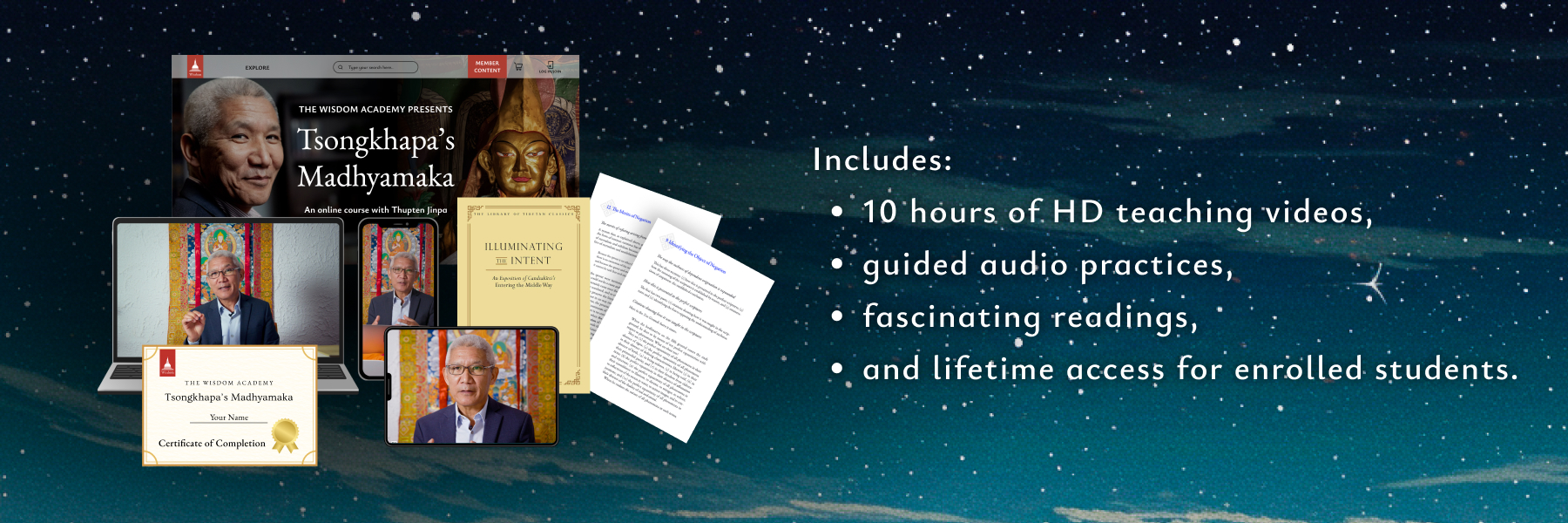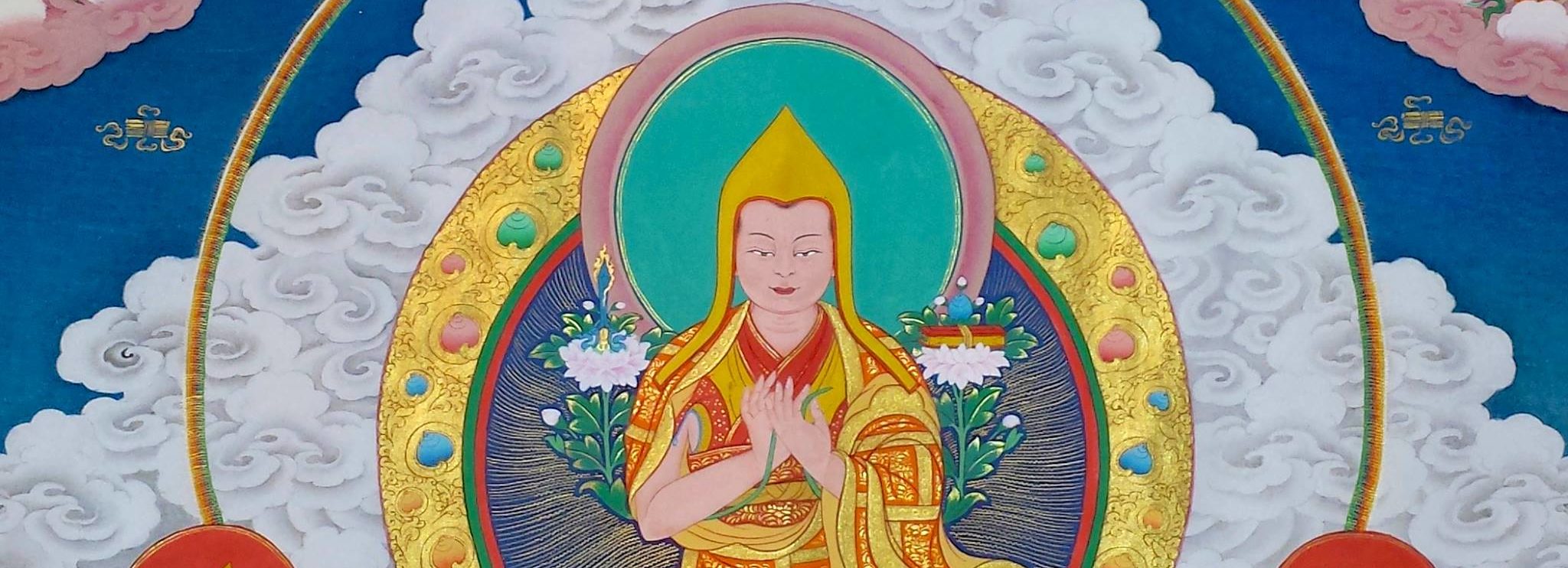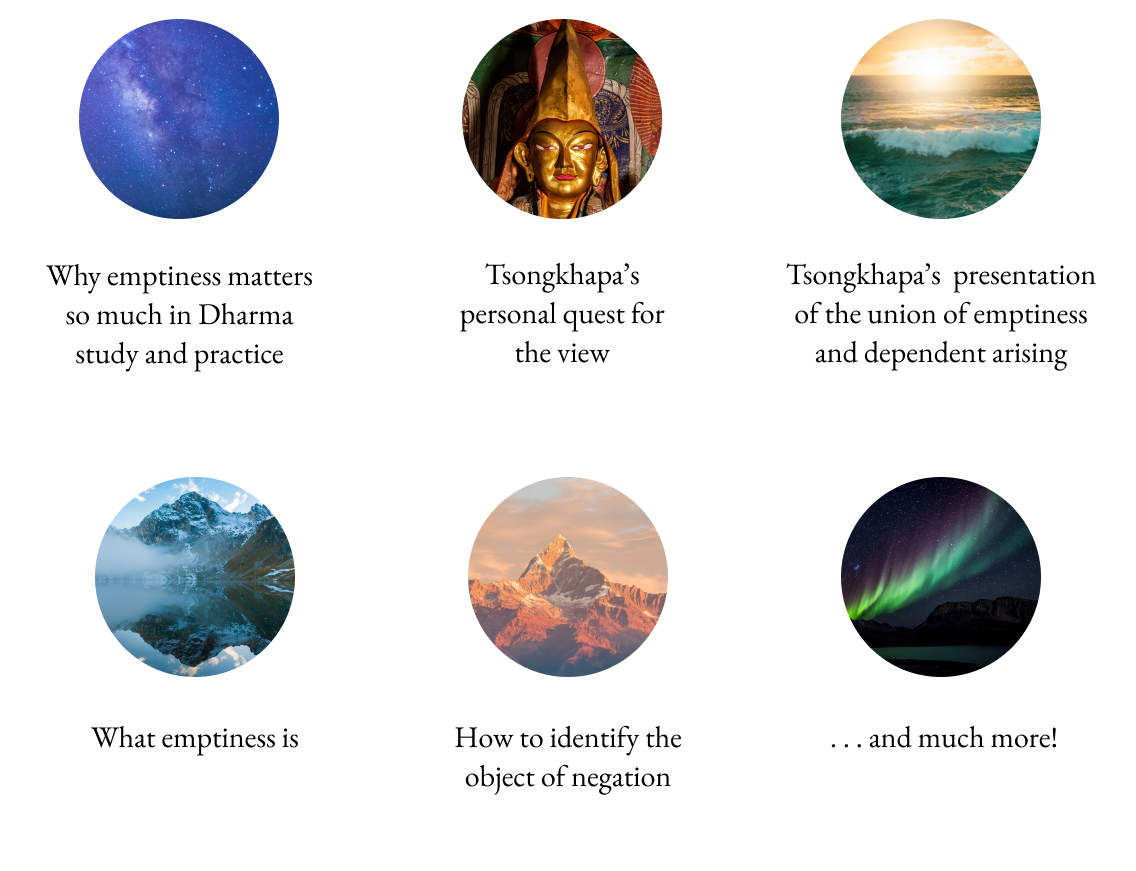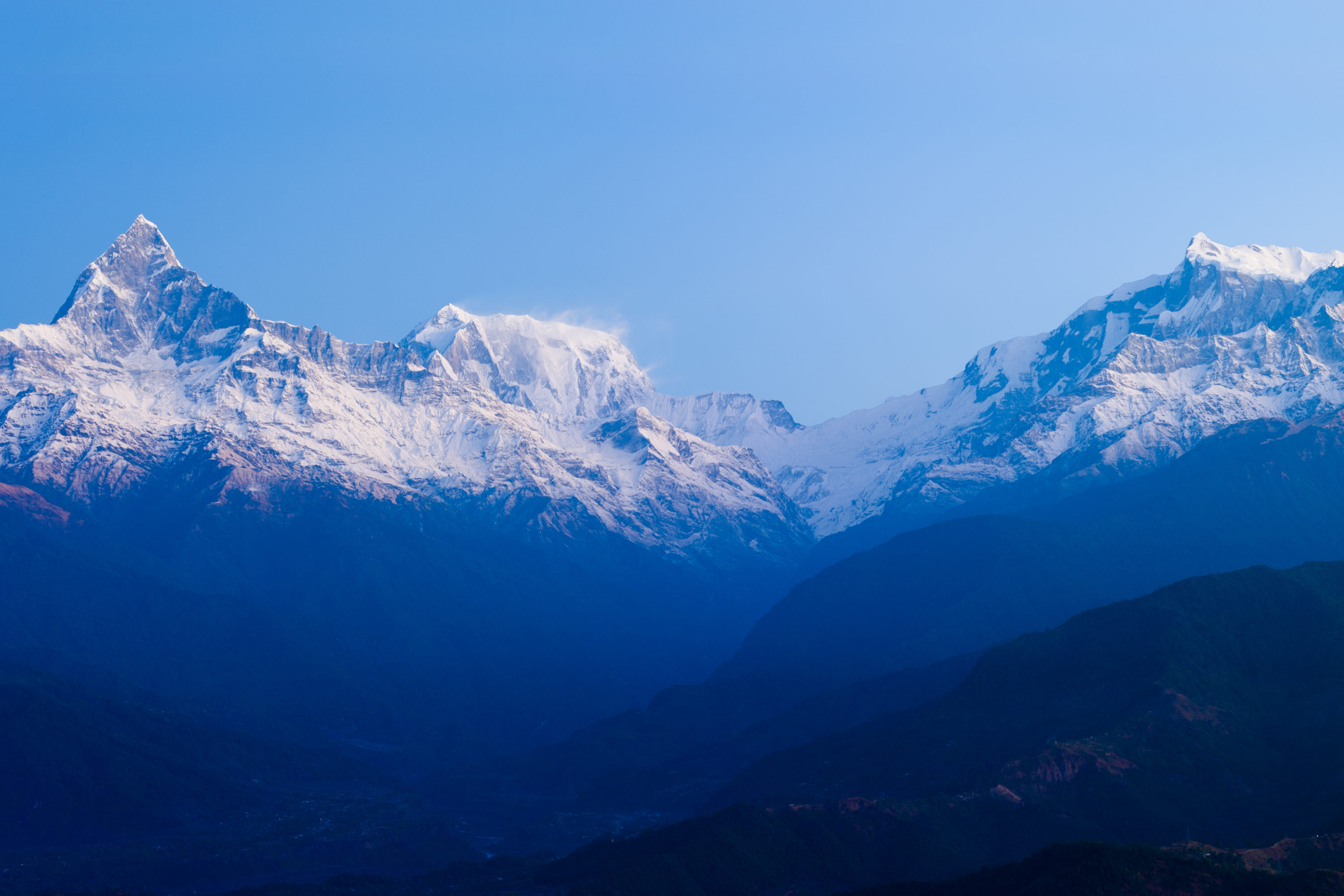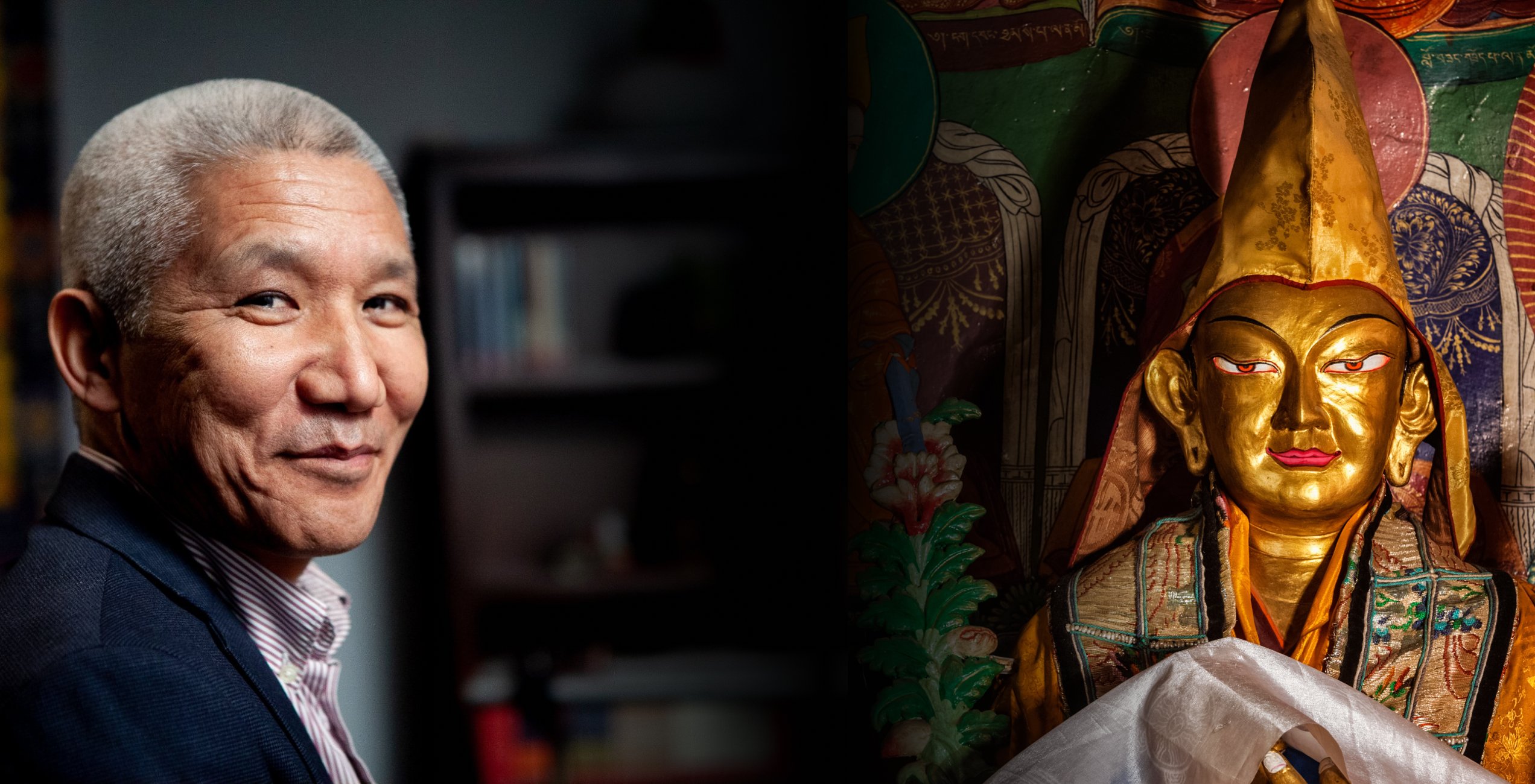
THE WISDOM ACADEMY PRESENTS
Tsongkhapa’s Madhyamaka
An online course with Thupten Jinpa
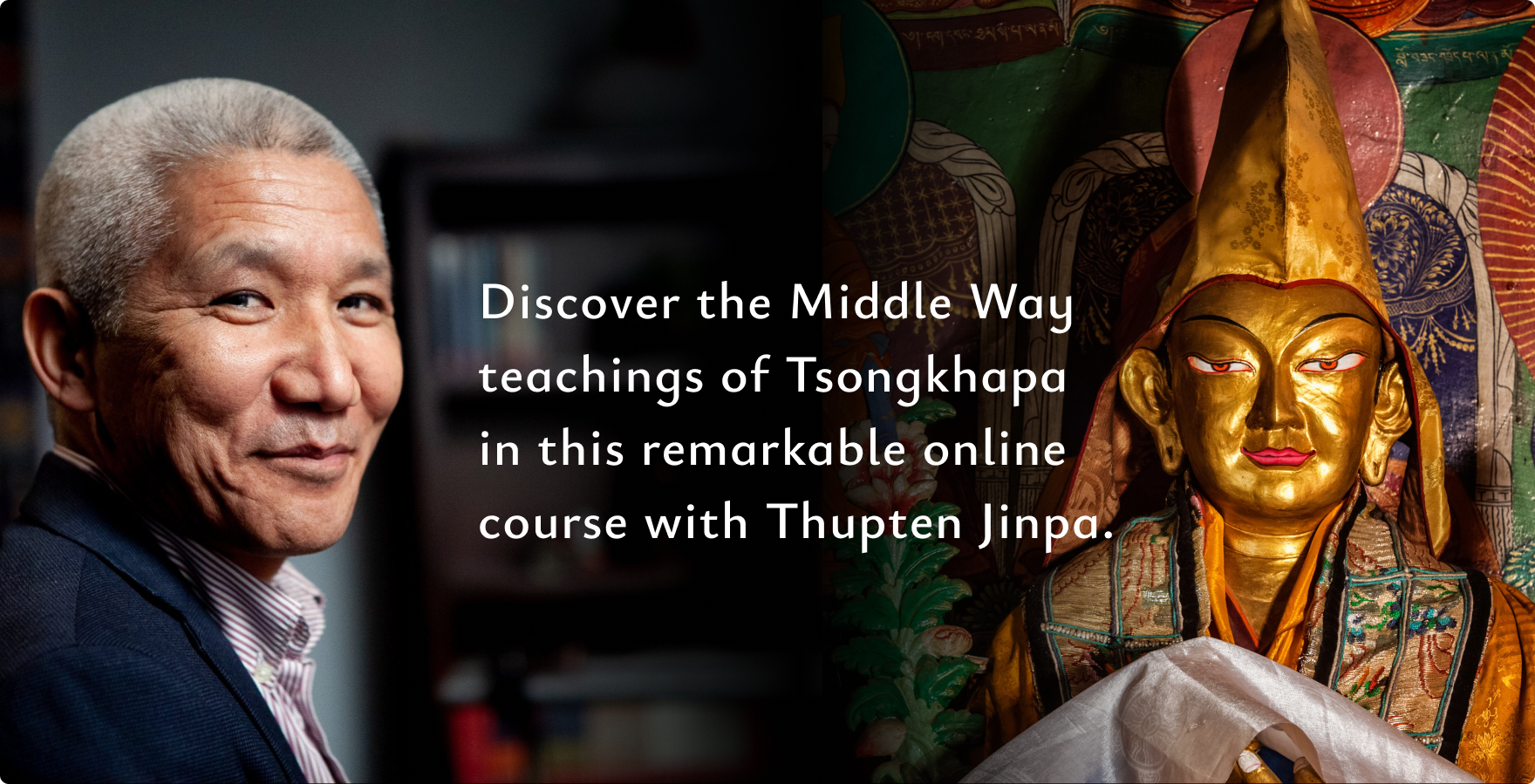 In Tsongkhapa’s Madhyamaka, Thupten Jinpa will take you on a 10-lesson journey through some of the most fascinating and important ideas in Buddhism. You’ll discover the mādhyamaka teachings of one of the most renowned minds in Tibet: influential monk and yogi Je Tsongkhapa Losang Dragpa (c. 1357–1419).
In Tsongkhapa’s Madhyamaka, Thupten Jinpa will take you on a 10-lesson journey through some of the most fascinating and important ideas in Buddhism. You’ll discover the mādhyamaka teachings of one of the most renowned minds in Tibet: influential monk and yogi Je Tsongkhapa Losang Dragpa (c. 1357–1419).
Tuition: $397 USD
Self-study course: you can take this course at your own pace. After enrolling, check your email for a welcome email with instructions on how to take the course. When you enroll in any Wisdom Academy course, you agree to our terms of use. Enrolled students have lifetime access to course materials. Wisdom is a 501(c)(3) nonprofit. Your tuition supports the creation of more courses like this one. Thank you! For more about our terms, please see the Wisdom Academy FAQ.
Practitioners can gain access to the key to liberation as they deepen their understanding of what it means to realize emptiness.
Thupten Jinpa explores why emptiness matters through Tsongkhapa’s personal quest for the view of mādhyamaka philosophy. Students will receive a detailed overview of the landscape, and learn how to bring emptiness into meditative practice.
This course provides a rare and precious opportunity to learn from one of the world’s leading experts in Buddhism. As interpreter for His Holiness the Dalai Lama and a renowned author, translator, and scholar, Thupten Jinpa brings to the course his years of practice and study as well as his deep connection with Tsongkhapa.
This course is available in self-study mode, so there are currently no live components besides the optional forum discussions. Enrolled students have ongoing access to course materials. Read on for more information or click below to enroll now.
Tuition: $397 USD

What You Get
10 one-hour video lectures with Thupten Jinpa
Ten guided meditations and reflections
Over 100 pages of readings selected by Jinpa himself
Short quizzes to test your knowledge
A forum to discuss with fellow students
I am just blown away by this course, I have enjoyed it so very much. Jinpa-la has clarified so many important points that I somehow missed along the way during my studies, and has done so, brilliantly. This course has already, and will continue, to help me in ways that will be powerful in my practice. I am most incredibly grateful for this particular teaching having risen up to meet me at this time in my life.
I am so thankful to have had the chance to participate in this course – it was indeed a privilege! Deep gratitude to Dr. Jinpa for his calm and careful explanations. So much to understand and practice! Thank you to Wisdom for making this course possible.
Most humble, heartfelt gratitude for the bounty you have presented clearly and articulately before us, Jinpa-la, Manjushri-son. Your gentle voice and clear guidance encouraging our pure exploration of this profound subject is a precious gift beyond words. To the staff at Wisdom Publications, this course has been wondrous. Deeply grateful for your efforts to cause it to be offered, to persuade our kind teacher to lead it, and to undertake all the administrative efforts necessary for it to run so seamlessly. It has been exceptional throughout. A+ job, folks.
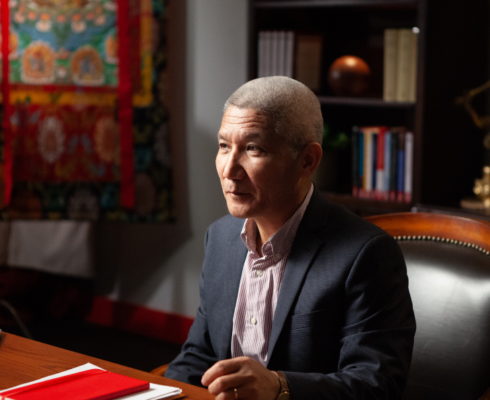
Lesson 1: Why Emptiness Matters
In this introductory lesson, Thupten Jinpa explores the importance of the philosophy of emptiness and how it constitutes, directly or indirectly, the entirety of the Buddha’s teachings. By analyzing grasping to inherent reality and the conceptual elaborations that arise from such a belief, a wisdom opposite to the active “mis-knowing” of ignorance can be attained.
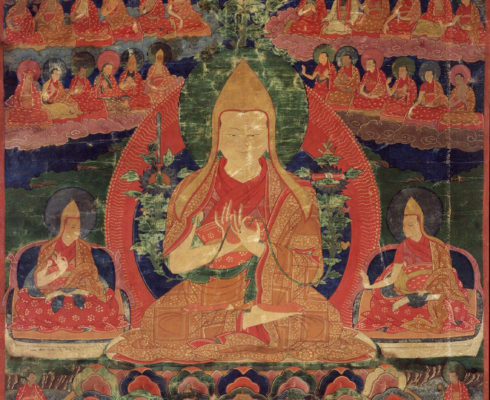
Lesson 2: Tsongkhapa's Personal Quest for the View
Thupten Jinpa gives a fascinating overview of Tsongkhapa’s biography, detailing key moments in his search for deeper understanding of the view of emptiness. Jinpa provides a synopsis of each of the five great mādhyamaka texts of Tsongkhapa and the unique features they convey, showing how they depend upon and support one another to present the complete view.

Lesson 3: What Exactly is Emptiness?
Thupten Jinpa delves deeply into emptiness itself, illustrating the negative dialectic approach rooted in the Prajñāpāramitā sutras and the Indian mādhyamaka masters. Tsongkhapa adopted this via negativa approach, siding with and inspiring later philosophers that emphasized the texts of Nāgārjuna.

Lesson 4: Identifying the Object of Negation
Tsongkhapa held the practice of identifying the object of negation to be a crucial step in the process of ultimate analysis. Thupten Jinpa sheds light on the fine points of this detailed level of analysis and why Tsongkhapa made this a pivotal element of his Great Treatise on the Stages of the Path to Enlightenment.

Lesson 5: What Remains in the Wake of Emptiness: Conventional Existence
A clear understanding of the status of conventional reality in relation to ultimate emptiness of intrinsic existence is said to be amongst the hardest to fully comprehend. Thupten Jinpa unpacks Tsongkhapa’s famous criteria for establishing conventional truths, providing insight to the radical relativity of mādhyamaka philosophy.

Lesson 6: The Two Truths: Identical or Different?
The paradoxical doctrine of two truths finds highest refinement in the mādhyamaka philosophy and provides critical insight to the entire endeavor of enlightenment in Buddhism. Thupten Jinpa structures this exploration of the two truths around defining the truths themselves, how they differ, where they intersect, and how an understanding of them is critical to liberation itself.

Lesson 7: The Svātantrika-Prāsaṅgika Distinction
Thupten Jinpa brings the debate between the Svātantrika and Prāsaṅgika Mādhyamaka interpretations to life, illustrating how this seemingly academic distinction actually provides a practical foothold for contemplation in personal practice.
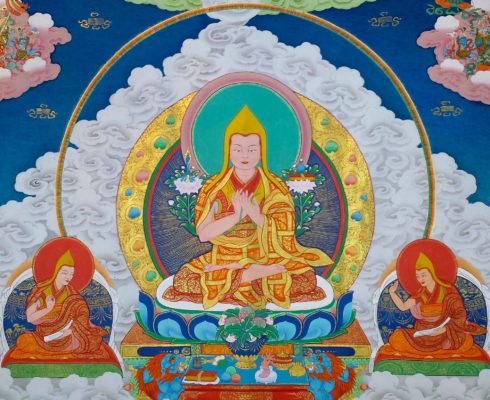
Lesson 8: Unique Tenets of Prāsaṅgika According to Tsongkhapa
Tsongkhapa’s deep inquiry into mādhyamaka thought helped him elucidate a number of what he viewed to be unique tenets in the Prāsaṅgika position. Thupten Jinpa delves into three tenets more closely, providing rich and engaging surveys of the logic and context of each.

Lesson 9: Emptiness and Buddha-Nature
Thupten Jinpa addresses the enigmatic tension between the philosophy of emptiness and the concept of Buddha-nature. The role of hermeneutics is crucial when encountering the broad landscape of interpretive and definitive views presented in the Mahayana literature.

Lesson 10: Culmination of the Analysis of the View
In this final lesson, Thupten Jinpa ties together the various strands of thinking and debate presented with a review of the practical process of meditation on emptiness. Thupten Jinpa highlights the eminently practical motivation behind the entire project of understanding emptiness: conclusive certainty with respect to the truth of the way things are. It is through this seeing that we may be liberated.
1) If you want to understand Buddhist teachings on emptiness and the middle way, and Tsongkhapa’s teachings in particular
2) If you want the opportunity to study with Thupten Jinpa, translator for His Holiness the Dalai Lama and one of the world’s leading experts on Buddhism
3) If you want to learn how to bring your understanding of emptiness into your practice.
Tuition: $397 USD
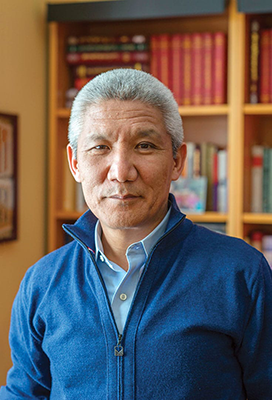 Thupten Jinpa Langri was educated in the classical Tibetan monastic academia and received the highest academic degree of Geshe Lharam (equivalent to a doctorate in divinity). Jinpa also holds a BA in philosophy and a PhD in religious studies, both from the University of Cambridge, England. Since 1985, he has been the principal translator for the Dalai Lama, accompanying him to the United States, Canada, and Europe. He has translated and edited many books by the Dalai Lama, including The World of Tibetan Buddhism, Essence of the Heart Sutra, and the New York Times bestseller Ethics for the New Millennium.
Thupten Jinpa Langri was educated in the classical Tibetan monastic academia and received the highest academic degree of Geshe Lharam (equivalent to a doctorate in divinity). Jinpa also holds a BA in philosophy and a PhD in religious studies, both from the University of Cambridge, England. Since 1985, he has been the principal translator for the Dalai Lama, accompanying him to the United States, Canada, and Europe. He has translated and edited many books by the Dalai Lama, including The World of Tibetan Buddhism, Essence of the Heart Sutra, and the New York Times bestseller Ethics for the New Millennium.
Jinpa has published scholarly articles on various aspects of Tibetan culture, Buddhism, and philosophy, and books such as Songs of Spiritual Experience: Tibetan Poems of Awakening and Insight (coauthored) and Self, Reality and Reason in Tibetan Thought. He is the editor of the Library of Tibetan Classics. He serves on the advisory board of numerous educational and cultural organizations in North America, Europe, and India. He is currently the president and the editor-in-chief of the Institute of Tibetan Classics, a nonprofit educational organization dedicated to translating key Tibetan classics into contemporary languages. And he also currently chairs the Mind & Life Institute and the Compassion Institute.
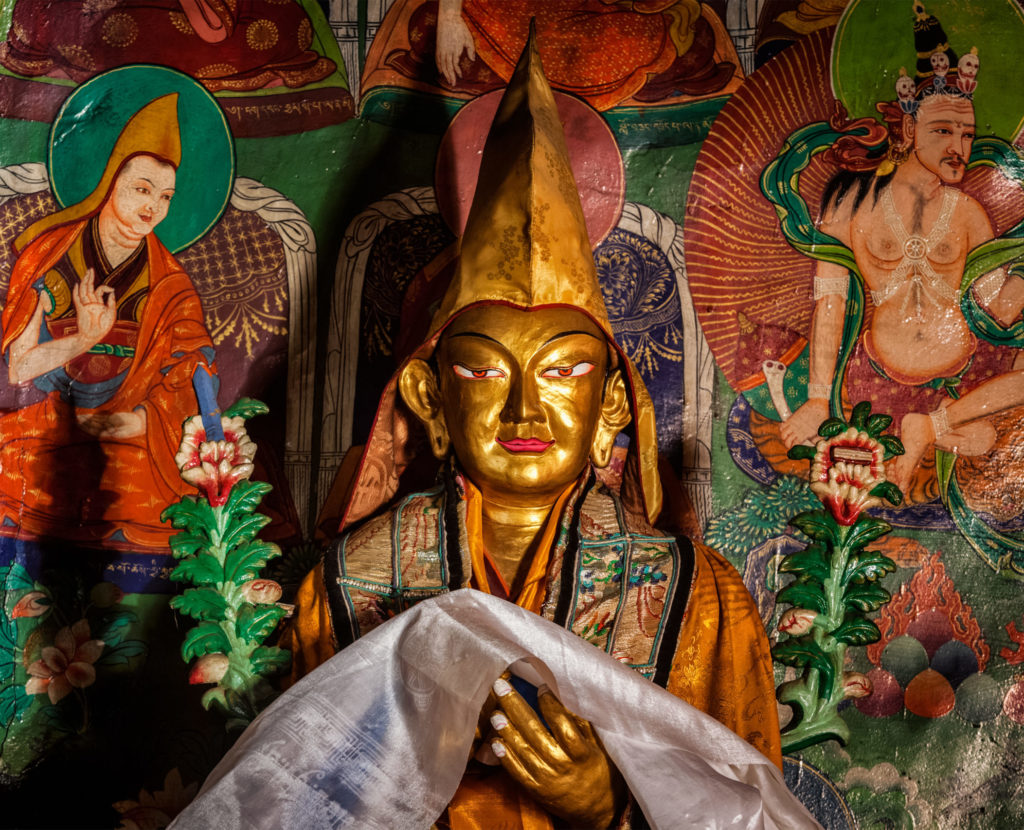
Tsongkhapa is arguably the most influential figure in the history of Tibetan Buddhism. Born in northeastern Tibet in 1357 and educated in central Tibet, Tsongkhapa rose to prominence rapidly through his mastery of the Indian Buddhist classics that formed the core of Tibetan monastic curriculum at the time. His first major work, the Golden Rosary, completed at the age of thirty-one, is a two-volume exposition of Perfection of Wisdom studies that cemented his reputation as a great scholar. Tsongkhapa was a maverick with an independent mind who shunned formal affiliation with any of the established Tibetan schools of his time, including that of his primary teacher, Rendawa. Through close reading of key Buddhist texts, sustained critical reflection, and extensive meditative cultivation over prolonged periods, Tsongkhapa by the end of the fourteenth century had synthesized the vast Indian Buddhist heritage—philosophical, psychological, and spiritual—into a unique and remarkable system of Buddhist thought and practice that came to be known as the Geluk tradition.
Bio source: Illuminating the Intent, by Tsongkhapa, translated by Thupten Jinpa
Wisdom is a 501(c)(3) nonprofit organization. When you purchase from Wisdom or make a donation, you are helping us to continue our mission to make the Dharma as widely available as possible. Thank you!
The Wisdom Academy is the leading provider of high-quality online courses about Buddhism and meditation.
The Wisdom Academy was founded in 2016. Since then, we’ve grown to be the leader in online Buddhist learning, with over 45 courses and thousands of students enrolled.
In the Academy, dedicated students come together with beloved teachers to learn authentic philosophy and practices for awakening.
Our courses offer teachings on Dzogchen, shamatha, mahamudra, vipassana, mindfulness, jhana, and much more. The clear, progressive structure of the courses will support you in learning about the profound philosophy and practices of the Dharma. You’ll discover the vivid and immediate ways that the teachings can create more ease, joy, and freedom in your daily life. Click here to learn more and explore our course catalog.
![]()


